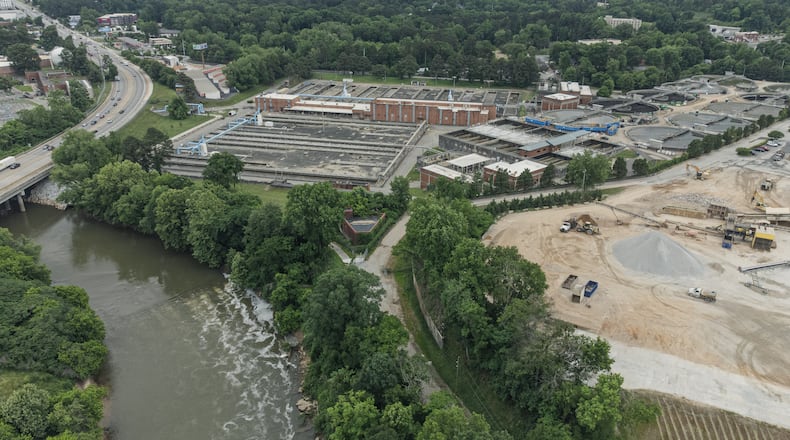As the city of Atlanta and DeKalb County look to invest billions in long-overdue — and, in some cases, legally mandated — water and sewer system fixes, both governments are also grappling with dozens of customers who owe staggeringly high water and sewer debts.
In the vast majority of cases, multifamily complexes owe the debts, while small city governments or facilities like the Fulton County Jail are also on the list. Only one individual is listed with a debt of $500,000 or more, and she is deceased.
In Atlanta, as of February, 35 customers owed more than $500,000 for water and sewer services, totaling nearly $65 million in debt, according to records The Atlanta Journal-Constitution obtained under the Georgia Open Records Act.
In DeKalb, 22 customers owed at least $500,000 for a total of nearly $42 million in debt, documents show.
Both governments must spend billions of dollars on sewer repairs under federal court settlements to resolve Clean Water Act violations. And both have pledged billions more to fix persistent water main breaks that cause outages or boil water advisories for residents, businesses and other customers.
The high tabs have raised questions about collection practices in both jurisdictions as they struggle to repair aging infrastructure while inflation drives up the cost of labor and materials.
But no city of Atlanta customer owes more than DeKalb County, which incurred a debt of more than $22 million to the city for wastewater treatment, according to public records and officials.
Wastewater from northern DeKalb is sent to Atlanta’s R.M. Clayton Water Reclamation Plant for treatment, per an agreement that dates back to 1968. Atlanta bills DeKalb for sewage treatment and a portion of the plant’s capital improvement costs. The capital improvement bill accounts for more than $17.3 million of DeKalb’s debt to Atlanta, records show.
Jonathan Williams, deputy watershed commissioner in Atlanta, recently told the City Council’s finance committee that both governments have been discussing the debt and that DeKalb occasionally asks questions or raises objections to Atlanta’s accounting methods. He said DeKalb would have until late May to make a payment.
“We’re very comfortable with where we are,” Williams said. “It’s about them legislating it and agreeing to what we’ve provided to them. There’s no ambiguity from our perspective.”
In written responses to AJC questions, DeKalb County CEO Lorraine Cochran-Johnson did not address the issue in detail but referred to recent water and sewer rate increases she spearheaded that will more than double the average DeKalb household’s bill over the next decade, and generate more than $2 billion in revenue.
County Commissioner Ted Terry, who represents DeKalb’s western half, said the county has been in debt to Atlanta for a little more than two years.
“I would chalk it up to us not having the revenue to pay it,” Terry said. “Now that we’ve got the revenues set, we really do need to pay Atlanta for what we owe them. That’s just the right thing to do with one of our closest municipal partners.”
Four other local governments owe Atlanta large sums for capital improvements, the records show. In written responses to the AJC, an Atlanta watershed spokesperson did not say how old the debts are.
East Point owes almost $5 million, while College Park owes about $2.8 million, records show.
An East Point spokesperson declined to comment. Lawyers for Atlanta and College Park are in discussions over that city’s bill, which is related to an agreement for a sewer project, College Park spokesperson Antoinette Govan said. She declined to comment further.
Atlanta treats Hapeville’s sewage at the South River wastewater facility, said Lee Sudduth, community services director in Hapeville. The smaller city, with a population of about 6,700, owes Atlanta about $2.4 million for Hapeville’s share of capital projects at the facility, Sudduth said.
The balance exceeded $5 million more than a decade ago, Sudduth said. Hapeville has been paying what it can afford annually through an arrangement with Atlanta, he said.
“Obviously I would like to be able to pay that all at one time, but we can’t do that,” he said.
Atlanta records show Fulton County also owes almost $2.5 million for water and sewer services at the jail on Rice Street. The city last year said Fulton owed $5.7 million in water bills across 90 different accounts, which Fulton officials disputed.
The issue is still not resolved, Fulton County Chief Financial Officer Sharon Whitmore said last month to the County Commission.
Fulton last communicated with the city in November, said Whitmore, adding she believes Atlanta is prioritizing water debt talks with Atlanta Public Schools and officials will turn their attention to Fulton after that is resolved.
In one case, Atlanta owes itself nearly $1 million. The parks and recreation department owed about $983,000 at an address that corresponds to Rodney Cook Sr. Park in Historic Vine City, records show.
The watershed department “is in contact with all of our internal customers and is developing payment arrangements,” spokesperson Schereé Rawles said.
Emory University owes DeKalb County
DeKalb County records show Emory University owes nearly $7 million for water and sewer services, but that is because of difficulties reading their usage, Cochran-Johnson said. She and Emory spokesperson Laura Diamond said the readings are impacted by the WaterHub, an innovative campus facility that turns raw sewage into water for non-potable purposes such as indoor climate control and flushing toilets.
DeKalb and Emory remain in active discussions to resolve the matter, they said.
The vast majority of customers with high water debt in DeKalb are owners of multifamily buildings that measure their usage on a single meter. Some might need to resolve excess charges from water leaks, but in some cases tenants paid their share while property managers, homeowners associations or owners did not pay the government, officials said.
DeKalb began requiring individual water meters for new multifamily buildings in 2008. Atlanta does not require them.
Atlanta is still dealing with the fallout of its failure to shut off water to delinquent accounts from 2010 until 2023. The city also fell behind in writing off uncollectible debt, according to a 2023 audit.
“We have recently contacted the high-dollar multifamily properties to define a path forward for these accounts,” Rawles said.
Some of the balances are uncollectible as a result of bankruptcy proceedings, she said.
DeKalb also halted water shutoffs from 2016 to 2021 while it replaced faulty meters and fixed software that caused tens of thousands of erroneously high bills. Last month, Cochran-Johnson said, there were only 89 disputed bills in the county and 96% of water customers were current.
The customers with the highest outstanding balances have payment plans, and DeKalb places liens against the sale of their properties, Cochran-Johnson said.
Officials in Atlanta and DeKalb said they have not shut off water to multifamily buildings because of the harm to possibly blameless tenants.
“All these people would have to go somewhere,” Terry said. “They couldn’t live there, technically, because the health department would shut it down.”
The company that owns the Indigo apartment complex on Interstate 85 past Clairmont Road owed DeKalb County more than $12 million, records show. The property manager did not respond to an email seeking comment.
The Camelot Club Condominium Association, which owns a large complex in South Fulton, owed the city of Atlanta more than $2.5 million for water, records show. The amount is the most owed to Atlanta from customers other than local governments. The Camelot Club homeowners association did not respond to an email seeking comment.
That property is on the AJC’s list of “Dangerous Dwellings,” multifamily complexes with high crime rates and livability problems. Owners of several other complexes on the list owe Atlanta large sums for water, records show.
Among metro Atlanta’s largest utilities, the individual homeowner with the highest water debt is dead.
Ida Griffin is listed as the owner of a three-bedroom house in Mechanicsville. Records show she owes the city nearly $622,000. There was a perfect storm of factors — family members didn’t communicate she was dead or establish an account in their name, Rawles said, and a leak caused high bills while the city had a water shut-off moratorium.
Most of the debt is uncollectible under state law and the house is only worth about a third of the balance, so it wouldn’t be paid off even with a lien, Rawles said. The current occupant is paying down more recent debt but not the older charges, she said. The watershed, law and finance departments are working on a strategy to address similar issues, she said.
Houston Water Director James “Gregory” Eyerly took office this month as commissioner of Atlanta’s embattled watershed department. His task is to bring city sewers back into federal compliance by a 2027 deadline while overhauling the water system, ideally in time for next year’s World Cup.
“Any debt collected would support all our capital project needs,” Rawles said.
Highest delinquent water balances in Atlanta
DeKalb County $22.1 million
City of East Point $4.9 million
City of College Park $2.8 million
Camelot Club Condominium Association $2.5 million
Fulton County Jail $2.4 million
Highest delinquent water balances in DeKalb County
SMP Indigo SPE LLC $12.3 million
Emory University $6.9 million
Whitehall Forest East condos $4.8 million
The Terraces Condo Association $2.3 million
Villas at Decatur apartments $1.3 million
Source: City of Atlanta and DeKalb County records as of February 2025
About the Author
Keep Reading
The Latest
Featured

